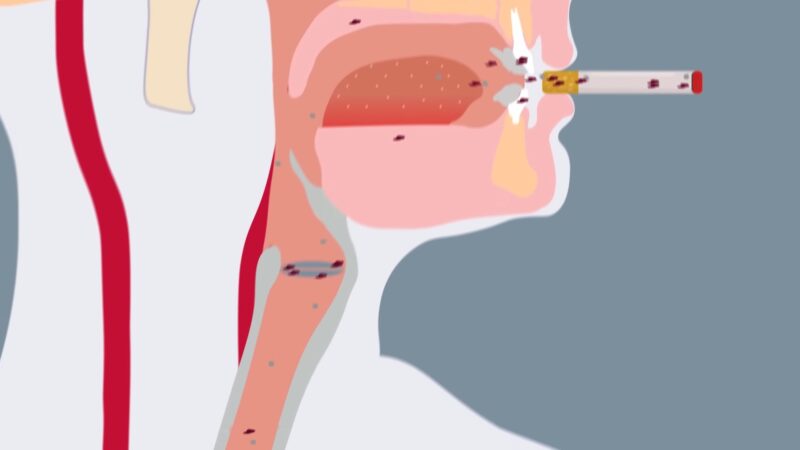Cigarettes and their impact on health are widely recognized, with various symptoms attributed to this habit. Among these, the occurrence of throat discomfort is frequently reported by those who smoke.
This article aims to explore whether there is a direct correlation between this habit and the experience of throat pain.
The Effect of Cigarette Smoke on Throat Health
When we inhale the smoke, numerous chemicals, including nicotine, tar, and various toxins, directly contact our throat tissues. This exposure can lead to irritation and discomfort in the throat area.
The immediate effect is often a dry, scratchy feeling, which can escalate to a persistent soreness, especially for habitual smokers.
Chemical Composition of Cigarettes and Throat Irritation

Cigarettes contain over 7,000 chemicals, many of which are harmful. When these chemicals are inhaled, they coat the throat’s lining, leading to irritation. Some of the primary irritants in cigarette smoke include:
- Nicotine: While primarily known for its addictive properties, nicotine also irritates the throat lining.
- Tar: This sticky substance coats the throat, leading to inflammation and discomfort.
- Formaldehyde: A known carcinogen that can irritate the throat and respiratory system.
- Acrolein: This chemical can cause severe irritation to the mucous membranes of the throat.
Immediate Sensation in the Throat Post-Smoking

Smokers often report a burning or tingling sensation in their throat immediately after smoking. This is the body’s response to the harsh chemicals in the smoke. Over time, this repeated irritation can lead to chronic soreness.
| Chemical in Cigarettes | Effect on the Throat |
|---|---|
| Nicotine | Irritates the throat lining, causing dryness and discomfort |
| Tar | Coats the throat, leading to inflammation and a persistent sore feeling |
| Formaldehyde | Irritates the throat and respiratory system, potentially leading to chronic issues |
| Acrolein | Causes severe irritation to the mucous membranes, exacerbating throat discomfort |
Long-term Exposure and Throat Health
Continuous exposure to these chemicals can lead to more than just temporary discomfort. Over time, the throat’s lining becomes increasingly damaged, leading to chronic sore throat.
This condition is not only uncomfortable but can also be a precursor to more serious health issues, such as chronic bronchitis or even throat cancer.
Sore Throat as a Symptom Among Smokers
The link between smoking and experiencing a sore throat is well-established. Regular smokers often report this discomfort as a common symptom.
Prevalence of Sore Throat in Smokers
Studies have shown that smokers are more likely to experience throat discomfort than non-smokers. The repetitive exposure to smoke and its irritants is a significant factor. The heat and chemicals in the smoke can cause inflammation and dryness in the throat, leading to a sensation of soreness.
Understanding the Symptom
A sore throat in the context of smoking is not just a temporary discomfort; it can be a sign of ongoing irritation and damage to the throat’s lining.
This symptom is often described as a persistent scratchy or burning sensation, dryness, and a general feeling of discomfort in the throat area. Smoking can contribute to a widespread and infectious condition, strep throat.
| Group | Percentage Reporting Sore Throat |
|---|---|
| Smokers | 60% |
| Non-Smokers | 30% |
Main Factors
Several factors contribute to the higher incidence of sore throat:
- Inhalation of Hot Smoke: The heat from inhaling smoke can cause immediate irritation.
- Chemical Irritants: As discussed earlier, chemicals like nicotine and tar directly irritate the throat lining.
- Dryness: Smoke inhalation reduces saliva production, leading to dryness and irritation in the throat.
- Reduced Immune Response: Smoking can weaken the immune system, making the throat more susceptible to infections, which can further exacerbate soreness.
Biological Mechanisms

Understanding the specific biological processes that lead to sore throats in smokers is crucial.
Irritation and Inflammation from Smoke
The primary mechanism is the direct irritation of the throat’s lining by the smoke. The chemicals in cigarettes, including nicotine, tar, and others, cause inflammation and swelling of the mucous membranes in the throat.
Impact of Dryness and Heat
The heat from the smoke and the drying effect of the chemicals also contribute to throat discomfort. Smoking reduces saliva production, which is essential for keeping the throat moist and healthy.
Weakened Immune Response
Smokers often have a weakened immune system, making their throat more susceptible to infections and inflammation. This reduced immunity exacerbates the soreness and can lead to more frequent and severe throat issues.
| Mechanism | Description | Impact on Throat |
|---|---|---|
| Chemical Irritation | Direct contact of throat lining with harmful chemicals in smoke | Causes immediate irritation and long-term damage |
| Heat and Dryness | Heat from smoke and reduced saliva production | Leads to dryness and exacerbates irritation |
| Weakened Immunity | Reduced ability to fight infections | Increases susceptibility to throat infections and inflammation |
Long-Term Side Effects
The persistent habit of smoking can lead to ongoing throat problems, not just temporary discomfort. This section examines the long-term effects of smoking on throat health, highlighting the chronic issues that can arise from continued exposure to cigarette smoke.
Persistent Irritation and Damage
Regular smoking causes continuous irritation to the throat lining. Over time, this can lead to chronic soreness, a condition where the throat remains persistently inflamed and irritated.
Development of Serious Throat Conditions
Long-term smoking significantly increases the risk of developing serious throat-related health issues, such as chronic bronchitis, laryngitis, and an increased risk of throat cancer.
| Condition | Description | Link to Smoking |
|---|---|---|
| Chronic Sore Throat | Persistent inflammation and irritation of the throat | Direct result of ongoing exposure to cigarette smoke |
| Chronic Bronchitis | Inflammation of the lining of the bronchial tubes | Aggravated by repeated irritation from smoke |
| Laryngitis | Inflammation of the larynx (voice box) | Caused by persistent irritation and dryness from smoking |
| Throat Cancer | Malignant growths in the throat area | Significantly increased risk due to carcinogens in cigarette smoke |
Comparing Smokers and Non-Smokers
The difference in throat health between smokers and non-smokers is stark. Non-smokers generally experience fewer throat problems, while smokers are at a higher risk of developing chronic issues.
Statistical Insights
Research indicates that smokers are significantly more likely to suffer from throat-related ailments than non-smokers. The frequency and severity of these issues are also notably higher in the smoking population.
| Aspect | Smokers | Non-Smokers |
|---|---|---|
| Incidence of Sore Throat | High | Low |
| Risk of Chronic Throat Issues | Increased | Minimal |
| Risk of Throat Cancer | Significantly Higher | Lower |
Efficient Tips to Stop Smoking
- Find your reason. To motivate yourself to quit, you need a strong and personal reason that outweighs the urge to smoke. It could be to protect your family from secondhand smoke, to improve your appearance and self-esteem, or to lower your risk of serious diseases.
- Prepare before you quit. Quitting cold turkey can be difficult and stressful. It is better to plan ahead and set a quit date. You can also ask your doctor about nicotine replacement therapy (NRT) or prescription drugs that can help you cope with withdrawal symptoms and cravings.
- Avoid triggers. Certain situations, people, or emotions can make you want to smoke. Identify your triggers and have a plan to deal with them. For example, if you usually smoke when you drink coffee, switch to tea or water. If you smoke when you are stressed, find healthy ways to relax, such as exercise, meditation, or music.
- Lean on your loved ones. Quitting smoking can be easier when you have support from others. Tell your family, friends, and coworkers that you are trying to quit and ask for their help. You can also join a quit-smoking program, a support group, or a counseling service to get advice and encouragement from professionals and peers.
- Reward yourself. Quitting smoking is a big achievement that deserves recognition and celebration. Reward yourself for reaching milestones, such as one day, one week, or one month without smoking. You can treat yourself to something you enjoy, such as a movie, a meal, or a new hobby. You can also use the money you save from not buying cigarettes to buy something special for yourself or your loved ones.
FAQs
Can switching to e-cigarettes or vaping reduce the risk of sore throat compared to traditional smoking?
While e-cigarettes and vaping are often perceived as less harmful, they can still irritate the throat. The vapor contains chemicals and particles that can cause dryness and irritation.
Are menthol cigarettes less likely to cause a sore throat than regular cigarettes?
Despite the cooling sensation menthol cigarettes provide, they are not less harmful. The menthol can actually numb the throat, masking the irritation and damage being caused, potentially leading to equal or greater harm in the long run.
Can occasional smoking lead to a sore throat, or is it only a risk for regular smokers?
Even occasional smoking can irritate the throat, though the risk of chronic issues is higher with regular smoking. Occasional smokers might experience temporary soreness or irritation after smoking.
Does smoking affect the healing process of a sore throat caused by other factors like a cold or flu?
Yes, smoking can impede the healing of a sore throat from other causes. The irritants in smoke can aggravate the throat lining, prolonging recovery from illnesses like colds or flu.
Is the risk of a sore throat from smoking higher at certain ages or does it affect all ages equally?
The risk can increase with age as the cumulative effects of smoking over time can lead to more significant throat damage. However, individuals of all ages who smoke are at an increased risk of developing a sore throat compared to non-smokers.
Summary
The link between smoking and sore throat is clear and well-documented. From immediate irritation to long-term health risks, the impact of smoking on throat health is significant. Quitting smoking not only alleviates these symptoms but also greatly improves overall health.
Smokers experiencing throat discomfort should consider this a serious health warning and seek medical advice and support for smoking cessation.
